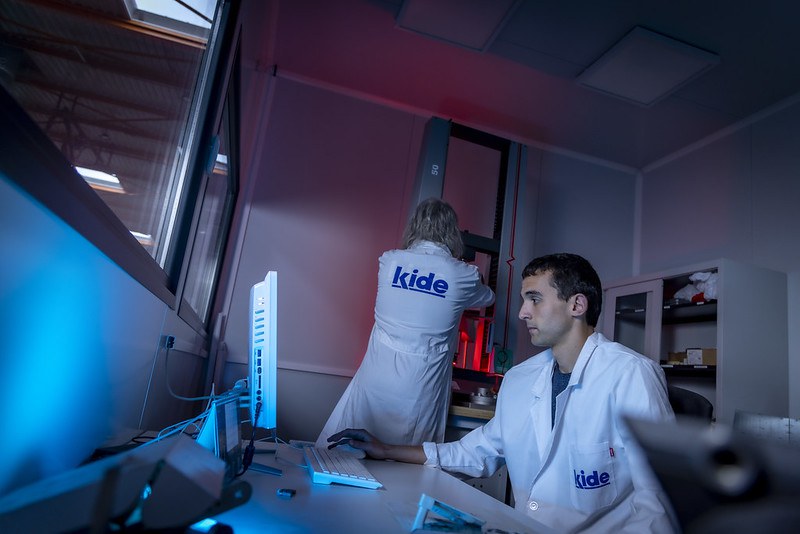Most read
- 1. Eika acquires Stone Cooker S.L and its innovative 'Suiseki' table to boost growth
- 2. Transforming plastic waste: how Primus is revolutionizing recycling in the automotive and home appliance industries
- 3. PM Pedro Sánchez visits MONDRAGON Kunshan Park, in China
- 4. "Jaguar Land Rover perceive us as essential technological assistant"
- 5. Orbea shines a light on its Olympic bikes
- 6. Juan Mari Aburto visits the Ikerlan Technology Centre in Bilbao
- 7. Orkli joins Biotz with an 11.11% stake
- 8. Dikar inaugurates its modern production plant in Arrasate, embarking on a new phase
- 9. MONDRAGON surpassed the 11 billion sales barrier in 2023
- 10. Adolfo Plaza, Ikerlan’s new chairman
Bloomberg praises MONDRAGON's ability to reduce social inequality

The MONDRAGON model has aroused the curiosity of the U.S. newspaper Bloomberg, which wanted to know why more and more U.S. cooperatives are showing interest in a model of "proven effectiveness" that has been able to better withstand the effects of the crisis caused by the pandemic and which, as the headline of the report says, is based on worker ownership and keeps social inequality at bay.
In addition to the report, Bloomberg has dedicated an episode of its podcast The Pay Check to MONDRAGON, in which the effects of the pandemic in different countries around the world are discussed to see to what extent the pandemic and its consequences are affecting the distribution of wealth. For the episode devoted to the Spanish economy, Bloomberg spoke with MONDRAGON executives, workers and other researchers about what differentiates the cooperative model from other places that also have a strong track record on equality, and how the system works in times of crisis.
Bloomberg joins the list of major international media such as "The New York Times" or "The Guardian" in taking an interest in MONDRAGON and praising its ability to cope with economic crises while maintaining employment
Bloomberg highlights that it is the working people who exercise ownership of MONDRAGON's 100 or so integrated cooperatives and that the difference between the highest and lowest paid is much smaller than elsewhere. As a general rule, the people who earn the most money do not earn, in any case, more than 6 times more than those who earn the least.
International interest in MONDRAGON, particularly in times of crisis
This is not the first time that a global media outlet has taken notice of MONDRAGON and that international journalists have visited the cooperatives integrated in the Corporation to get a closer look at them. In 2013, the British The Guardian talked about "the giant Spanish cooperative where times are hard, but few go bankrupt" and a couple of years ago The New York Times published a report with an eloquent beginning, "if the Erreka cooperative worked like the rest of the companies", said the American newspaper, "the pandemic would have been much more traumatic for its workers". The interest in MONDRAGON in the United States is not new either. In January of this year, in an interview with the newspaper El País, professor Noam Chomsky praised the virtues of MONDRAGON, as he had done on previous occasions, and stressed that it is "a successful conglomerate based on the idea that the participants in a community should control it".
It is precisely times of economic crisis, such as those caused by the health emergency triggered by COVID-19, that increase global interest in a model of approaching work that, as MONDRAGON's 2021 data show, has demonstrated a greater capacity to cope with the ups and downs of the economy without losing jobs.
The Bloomberg report highlights that in Gipuzkoa, where many of the Corporation's cooperatives are based, the Gini coefficient that measures social inequalities is lower than in countries such as Finland or Sweden, despite the fact that in Scandinavia more taxes are paid, and that part of the reason for this is to be found in a cooperative fabric that creates wealth for its members.
"The objective of cooperatives is not to produce rich people, it is to produce rich societies," says Igor Herrarte, a Mondragon Assembly engineer interviewed by Bloomberg, something similar to what Baltasar Garcia Leon tells Bloomberg, who has been working as a cooperativist for three decades and assures that in other parts of the world he perceives greater social differences, "here your boss can be your neighbor."



















